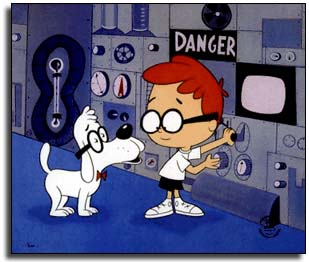
Hand pained limited edition for sale (and not by me).
Mr. Peabody, AKA the Wolf of Wall Street, and Sherman are sitting in Peabody's penthouse, when Sherman asks, "Where are we going today, Mr. Peabody?"
Peabody responds, "June 1997, to Washington."
Why, Mr. Peabody?
“The Asian Financial Crisis will break out in early July, raising fears of a worldwide economic meltdown and we have to stop it.”
His curiosity aroused, Sherman demands, “Tell me more, Mr. Peabody.”
Peabody explains, (quote from Wikipedia) “The crisis started in Thailand with the financial collapse of the Thai baht [Thai currency] caused by the decision of the Thai government to float the baht, cutting its peg to the USD [U.S. dollar], after exhaustive efforts to support it in the face of a severe financial overextension that was in part real estate driven. At the time, Thailand had acquired a burden of foreign debt that made the country effectively bankrupt even before the collapse of its currency. As the crisis spread, most of Southeast Asia and Japan saw slumping currencies, devalued stock markets and other asset prices, and a precipitous rise in private debt.”
“What are we going to do about it, Mr. Peabody?”
Holding a browned copy of the September 25, 1998 Wall Street Journal, and pointing to an article titled, "Would-Be-Keyneses Vie Over How to Fight Globe's Financial Woes" and Peabody reads, "President Clinton asks, ‘Is there a modern John Maynard Keynes to show us the path back to prosperity?’” Flipping to the back page to continue the article, he knowingly points to the pictures of Paul Krugman, Jeffrey Sachs, and Joseph Stilitz, and calmly declares, “Yes Sherman, and I know who they are!”
“Why didn't anyone listen to them?”
Peabody continues reading about Keynes from the WSJ, "[ Keynes], who died in 1946, fell from grace in the late 1970s and early 1980s as his followers in governments around the world couldn't easily understand or cure inflation. But the current talk of deflation, global overcapacity and irrational financial markets harks back to the Depression-era issues he confronted."
Sherman, surfing the Internet, lands on The Financial Times Economists' Forum, and eyes an article by Peter Clarke titled, "In the Long run we are all dependent on Keynes", and reads to himself, "It was US president Richard Nixon who declared: ‘We are all Keynesians now.’ Well, times change. Myths become vulnerable to debunking – and, if you wait long enough, to rebunking too. The Keynesian era came to grief in the 1970s. For about 30 years Keynes’s reputation languished. Then, in about 30 days, it has apparently been restored.’” Sherman responds, “Gee that sounds familiar Mr. Peabody.”
Peabody, glaring at Sherman, explains, “We are going to perform a natural experiment. We will try the Keynesian solution, and if they don’t work, we will try the New Classical solutions proposed by Robert Lucas, Thomas Sargent, and Edward Prescott. Doing something about a problem that has not happened yet just might work. If that doesn’t work, we’ll try New Keynesian solutions proposed by Greg Mankiw, David Romer, and Olivier Blanchard.”
“And we’ll try plans until one works?” Sherman asks innocently, and then he grasps the genius of Peabody’s plan, “Everybody will wake up and the Asian Financial Crisis will never have happened?”
“Yes, and maybe the American Financial Crisis will be history as well if policy makers learn from past success.” Peabody declares, and then thoughtfully observes, “Another possibilities exist: People might wake up and find that nothing has changed. This means that we none of the policies worked, or that policy makers did not listen to hard advice from good economists.”



No comments:
Post a Comment